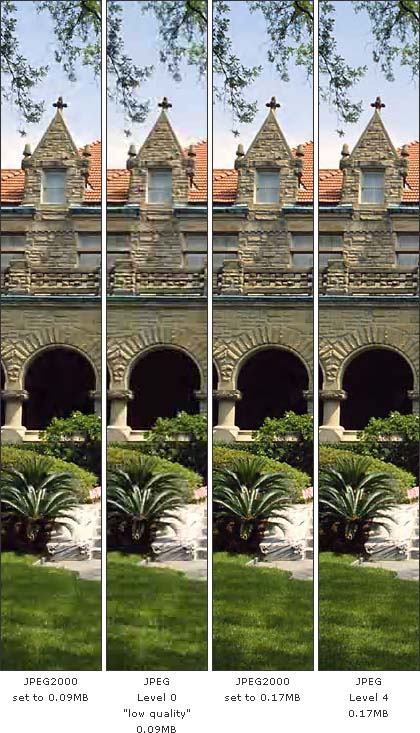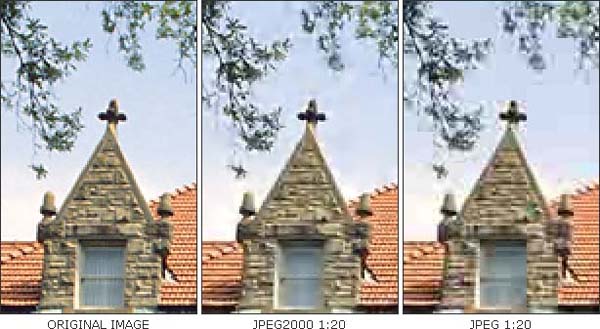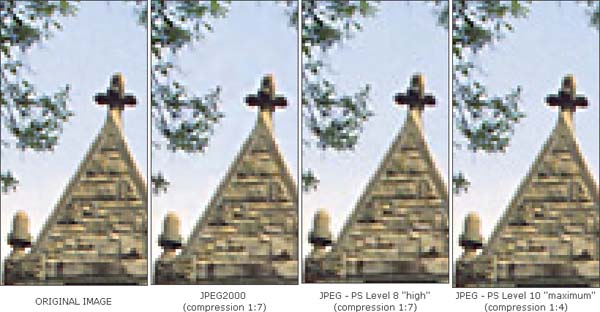Introduction
JPEG2000 is a fairly new standard which was meant as an update of
the wide-spread JPEG (Joint Photographic Expert Group) image
standard. JPEG2000 may share its name with the older standard but
under the skins the relationship between the two is next to nil. The
lossy image compression mode of JPEG2000 is based on the so-called
"discrete wavelet transformation" which is supposed to be more
efficient compared to the JPEG algorithm based on "cosine
transformation"..
Now where's the beef ... ? JPEG2000 offers ... (citing the JPEG2000
FAQ at http://www.jpeg.org)
- Better efficiency in compression
(incl. 48 bit color depth support)
- Possibility of lossless
compression>
- Decoding with different output
resolutions>
- A process to calculate the
integrated bit rate (possibility of reaching an aimed bit rate)
- Dividing the image into smaller
parts to be coded independently from the others
- Improvement in noise resilience
- Access to the compressed bit rate
at any point in order to access the image directly
- Better performances in
coding/decoding through many different cycles
- More flexible file format
The current reality
Similar to JPEG there's no requirement to implement to complete
standard which can result in incompatibilities between different
applications (it was the same in the early days of JPEG). While the
complexity of the implementation didn't really help to boost the
acceptance in the field JPEG2000 is now slowly entering the
mainstream. The very latest imaging applications often offer a
JPEG2000 file format though it still tends to be limited to 24 bit
color depth.
The relatively harsh computing requirements have probably prevented
the adaptation in digital cameras so far.
The Tool
Test Environment:
Photoshop 6 with JPEG2000 Plug-in from http://www.fnordware.com/
The plug-in is free and unlike many competitors it seems to be a
usable implementation incl. lossless mode and especially 48bit color
support. Some special features are not implemented but for normal
image archiving the Fnord implementation is just fine. The plug-in
is available both for Win as well as Mac for Photoshop 5.5 & up.
The JPEG2000 dialog box is pretty simple. You can select between
lossy and lossless compression. In lossy mode you can select whether
to focus either on a specific target file size or an abstract
quality level. The tool automatically switches between 24bit or
48bit storage dependent on the color depth of the raw image in
Photoshop.

Let's have a look at it ...
The analyzed image has a raw size of about 2 MB (= 1024 x 669 pixel,
24 bit color depth).
At 100% quality (Photoshop JPEG quality = 12) JPEG gives us a
compression of 990 KB vs 810 KB with JPEG2000. So at 100% quality
the compression is a little better than 1:2 here. Right from the
start JPEG2000 has a 20% advantage here - not extreme but more than
nothing.
Below you can find an image portion comparison of JPEG and JPEG2000
normalized to a specific compression level (except at 100% quality):

As expected the
difference in quality is next to zero when comparing images with a
quality level of 100% but there're some more or less obvious
differences at more bold compression rates.
Let's start having a look at the extreme end - at a compression rate
of 1:20. See the left 2 pictures in the image row above as a
reference without magnification.
The following images are ENLARGED BY 200% for a better illustration
of the differences:

A compression rate of
1:20 is quite extreme and naturally even JPEG2000 can't recreate the
fine structures of the original image. Nonetheless it does a much
better job than JPEG here. You may notice that the (in-)famous
blocks (the 8x8 pixel blocks from the cosine transformation) are no
longer present in the JPEG2000 image. The halo artifacts around
contrast transitions (e.g. roof to sky) are also much less
pronounced and there're no extreme color defects. Overall the
JPEG2000 result looks soft, like sprinkled with water, but it isn't
completely unusable like the JPEG result.
Ok, let's have a look at a much more conservative compression rate -
Photoshop JPEG Level 8 ("High Quality") or a compression rate of
about 1:7 plus a JPEG sample at 1:4. The images below are ENLARGED
BY 400%.

This is getting more
interesting now because compression levels of 1:6 or 1:7 are widely
used in digital cameras. It is already quite hard to spot any image
degradation in the original-sized images. Nonetheless you can easily
notice some difference when enlarging some critical image portions.
Upon closer observation there's still a very slight difference
between the original and the compressed JPEG2000 variant. Looking at
the sky the JPEG2000 compression has a smoothening effect which is
in fact positive in this context. All critical details remain
intact. On the other hand the compressed JPEG picture is still
introducing some quite strong halo artifacts again though there're
no color shifts anymore. The quality is probably less than what can
be considered acceptable as "near lossless". Even at the further
reduced compression level of 1:4 the image cannot match the 1:7
compressed JPEG2000 variant.
JPEG2000 vs TIFF
Thanks to its 48bit color mode JPEG2000 is also serious competitor
for the ancient but still wide-spread TIFF format.
I did a short test with a large image file (5443x3636 pixel, 16bit
color depth):
TIFF 116 MB
TIFF with LZW compression 150 MB (which proves that LZW is
ineffective for image compression)
JPEG2000 - lossless 61 MB
JPEG2000 - 100% quality (lossy mode) 21 MB
PSD (native Photoshop)
116 MB
Assuming that the JPEG2000 implementations will stabilize soon it is
quite obvious that TIFF may not be the primary choice for image
archiving much longer. If needed you can convert from JPEG2000 back
to TIFF anyway.
References:
For technical background information about JPEG2000 you may have a
look at the JPEG2000 FAQ at http://www.jpeg.org. | 

